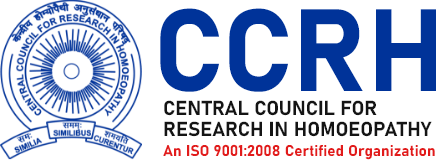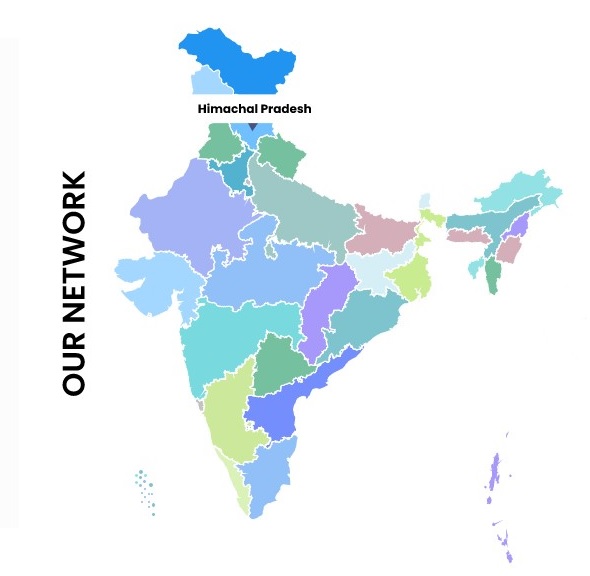CENTRAL COUNCIL FOR RESEARCH IN HOMOEOPATHY
CITIZEN CHARTER
-
INTRODUCTION
Homoeopathy is a safe, time tested popular and widely accepted therapeutic system in India. Though born in Germany, Homoeopathy established in India and gained popularity since its advent in the country in 1839. The Government of India, recognizing the mass acceptance of the system in the country, has taken a number of steps to integrate homoeopathy together with other traditional health care systems. An institutional framework has been established for clinical practice, education, research and drug safety systematically. The research initiative was heralded with a committee in 1963 and in 1969, the Government of India established the Central Council for Research in Indian Medicines and Homoeopathy for conducting systematic research in respective fields.
In 1978, the CCRIMH was dissolved to pave way for the constitution of four separate research Councils, one each for Homoeopathy (CCRH), Auyrveda and Siddha Medicine (CCRAS), Unani Medicine (CCRUM) and Yoga & Naturopathy (CCRYN). Such independent set-up of the Councils facilitated the promotion of research in the respective disciplines, on their own strengths.
The Central Council for Research in Homoeopathy (CCRH) was formally constituted on 30th March, 1978, as an autonomous organization and was registered under the Societies Registration Act XXI of 1860. It was, however, in January 1979, that the Council started functioning as an independent organization.
2.Vision
Formulation, coordination and promotion of Homoeopathic Research on scientific footing.
3. Mission
- To conduct high quality research for scientific validation and global acceptance.
- To define and establish standards of Homoeopathic Research in consonance with God Clinical Practices-India.
- iii. To formulate appropriate research designs and tools as per need of Homeopathic Science.
- To devise strategies for integration and mainstreaming of Homoeopathy in the National Health Care System.
- To improve the processes, infrastructure for efficient functioning and quality output for recognition of the research centres.
- To undertake addition and revision of drugs in the Homoeopathic Pharmacopoeia of India.
- To develop research aptitude and skill in upcoming scientists.
- To streamline governance in the organization
4. Aims and Objectives
• To formulate the aims and patterns of research on scientific lines in Homoeopathy.
• To initiate, develop, undertake and coordinate scientific research in fundamental and applied aspects of Homoeopathy.
• To exchange information with other institutions, associations and societies interested in the objectives similar to those of the Council.
• To collaborate research studies with other Institutes of Excellence towards promotion of Homoeopathy.
• To propagate research findings through monographs, journals, newsletters, I.E. &C. materials, seminars/workshops and develop audio-visual aids for dissemination of information to the profession and public.
A. Research activities of the Council include research on
• Disease Conditions – under Clinical Research
• Drug Research – Drug Standardization, Drug Proving and Clinical Verification.
• Fundamental & Basic research.
• Public Health Initiative Programme The Council has also undertaken collaborative research work with many Institutes of Excellence in allied sciences.
B. Monitoringon
Technical Activities are monitored by Special Committees on Clinical Research/Drug Proving/Drug Standardization/Fundamental Research/Ethics Committee and Scientific Advisory Committee.
C.Dissemination of Research Activities
It is carried out by way of
- Participation in Health Melas/Exhibitions ii) Through publications, iii) Participation in National and International Seminars/Conferences. iv) Organising Continuing Medical Education (CME) programmes. Publication of the Council (Priced / free of cost) are available online.
D. Admin/Accounts
Council follows rules/regulations of the Government of India for all administration and accounts related matters and follow the directions of Ministry of AYUSH.
6. Our services and facilities
Providing Medicare services to general public through OPDs/IPDs of research institutes/units.
Taking up research projects and other activities as per recommendations of the Scientific Advisory Committee, Governing Body of the Council & Ministry of AYUSH and requirements of Homoeopathic System of medicine for development of Homoeopathic sciences.
Providing information on Homoeopathic System of medicine particularly research etc. to Ministry of AYUSH from time to time.
Providing infrastructural, logistic and administrative support to the Institutes/Units of the Council for carrying out their activities, projects etc.
Providing information related to research to practitioners of Homoeopathy and other stake-holders.
Providing support services for
Extra Mural Research Scheme of Ministry of AYUSH by providing technical support
Public Intervention Programs by integrating component of Homoeopathy.
Inculcating Research in Colleges through scholarship scheme.
IEC & Research dissemination for practitioners through Arogya and Health Melas, Conferences etc
Promptly addressing to the service/establishment matters and complaints related thereto.
7. Timelines
The Public Grievances are addressed within in the period of two months as per the guidelines of Department of Administrative Reforms and Public Grievances circulated vide No.K.11019/4/2015 dated 12th March, 2015.
In the case of Research Studies, the Timelines are laid down in the provisions of study related protocols.
8. Our website
Council maintains its website www.ccrhindia.ayush.gov.in where information about Council’s activities including its Institutes/Units are uploaded in the public domain.
The website has all the modern IT Tools like CPGRAMS, Facilities for uploading Tenders, Advertisements for recruitments, Results of recruitments for various posts, Annual Report and Other Publications of the Council including Research Findings.
9. Complaints and Grievances
The complaints and grievances may be addressed to:
Email : ccrhindia[at]gmail[dot]com or padgccrh[at]gmail[dot]com
Phone: 011/25824266
Email : ccrhindia[at]gmail[dot]com or padgccrh[at]gmail[dot]com
| Citizen Charter of the Council | Download (154 kB) |







.png)

.png)





